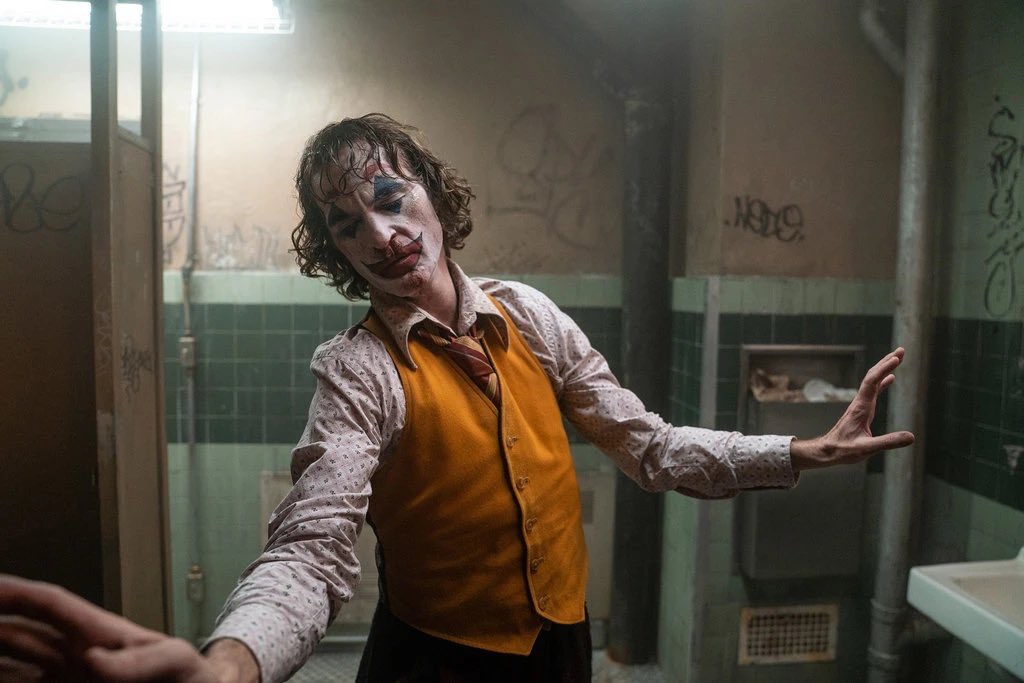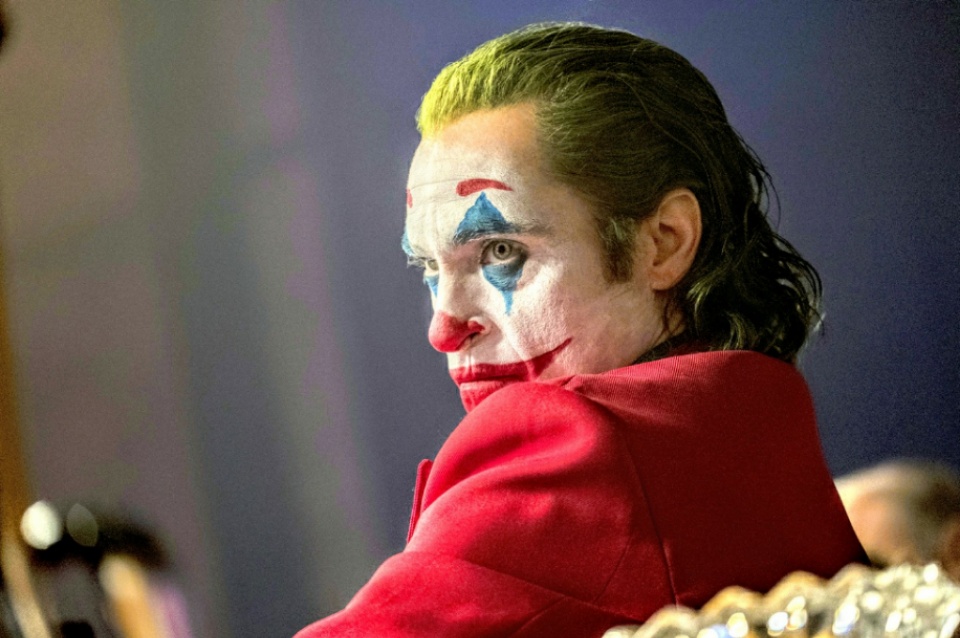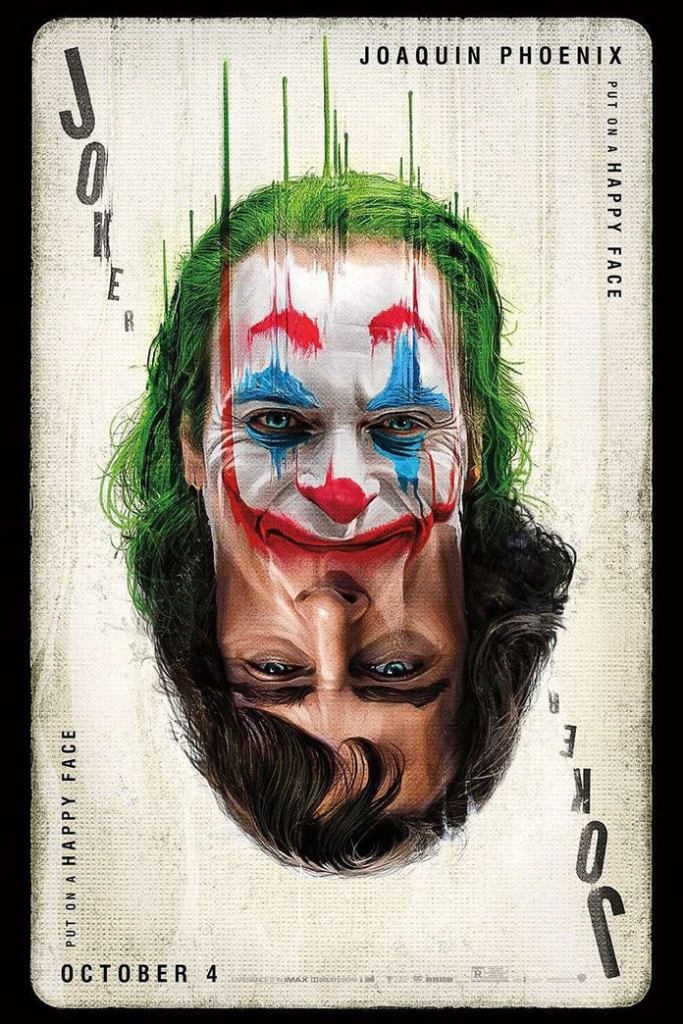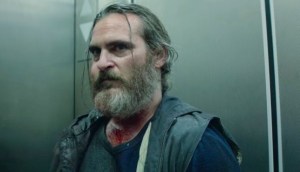Sean and I both saw Joker at TIFF last month, at back to back screenings. We met up for lunch afterward (I believe we had a slight pause before seeing the Harriet Tubman movie) because boy did I have thoughts, comments, and questions, which I tried not to yell too loudly because: spoilers.
Joaquin Phoenix plays Arthur Fleck in a totally new but not entirely unfamiliar way. He works as a (semi) professional clown but dreams of becoming a stand-up comic. He’s not a great clown; he gets a lot of complaints. Maybe it’s because he breaks clown rules. Real clowns prefer to paint their faces in large circles because pointy-ended makeup gives kids a subliminal fright. As you can see, Arthur paints both eyes and mouth with sharp ends, normally prohibited in the clown community. But there was another rule-breaker, historically. His name was John Wayne Gacy, and Joker’s makeup is likely a subtle nod toward this man, a serial killer who entertained kids on the side as Pogo the clown. He also raped, tortured and murdered at least 33 teenage boys during the 1970s.

Arthur has a complicated relationship with his mother (Frances Conroy), with whom he lives. She’s not well, and depends on his support, meager as it is. She may be somewhat delusional because she writes long-winded letters about her poor living conditions to one-time employer Thomas Wayne, hoping his outrage will be enough to improve their circumstances. Until such a time, mother and son alleviate their suffering by cuddling up every night to watch their favourite late night talk show, Murray Franklin (Robert DeNiro).
Arthur is dangerously thin, but people aren’t just uncomfortable about his physicality. There’s also the laughing. He laughs often, and inappropriately. It’s a neurological condition, and he hands out cards to strangers to ease their discomfort when his laughing goes on just a little too long. Still, it gets him into trouble. Joker’s laugh is iconic, and Phoenix taps into something so deranged, so haunting, it’ll nail your feet to the floor. The laugh alone justifies casting him. It is distinctive, different, perfect. Unforgettable. Scary as hell. It sounds almost painful for Phoenix and it sent shivers down my spine.

Meanwhile, Gotham City is a total shit show. Garbage is piling up everywhere, home to super rats that terrorize the city. It’s never explicitly stated, but I’m guessing it’s 1981. The clothes are very late 70s/early 80s, you can still smoke indoors, and both Blow Out and Zorro The Gay Blade are playing at the movies. People are starting to agitate. The city’s becoming increasingly dangerous. There’s an undercurrent of discontent. It isn’t safe. Arthur gets robbed, jumped, beaten. There’s a certain electricity in the air. We all know Joker to be a villain, but the way things are going, these people may see him as more of a hero. Kill the rich – that’s their slogan. Not a great time to be the Wayne family. But is Joker the symbol this rebellion needs?
Arthur Fleck is nobody’s idea of a hero. He’s a mentally unstable man. He’s been in psych wards. He takes 7 different kinds of meds but still feels bad all the time. He keeps a joke diary filled with suicidal thoughts. “The worst part of having a mental illness,” he writes, “is people expect you to behave as if you don’t.” I’ve lost count of how many Jokers we’ve seen on screen now, but it truly feels like Phoenix doesn’t fuck with any of them. Truly, he and writers Todd Phillips and Scott Silver have created Arthur/Joker from the ground up. He is an amalgam of childhood trauma, torment, debasement. You really get the sense that if anything had gone even just a fraction differently, you’d end up with a different guy. Arthur’s natural reaction to the world isn’t insanity or violence or evil. He genuinely seems to want to bring joy to the world. He wants to make the people laugh. He is searching for a way in. He is searching, I suppose, for identity. For purpose. But for one reason or another, this guy just keeps slipping through the cracks. There’s nobody to help him. If one person had reached out when he needed it, this would be a very different story. And I suppose that’s why this movie is so good. It doesn’t feel like a comic book movie, it feels more like Taxi Driver. It’s a character study. This man feels unpredictable, and yet we know his ending. There is a surprising amount of tension for a movie that can really only end one way. But director Todd Phillips creates this constant sense of swirling stress and anxiety, this emotional tautness by repeatedly having Arthur reach out. He doesn’t want to be a weirdo, or a loner. He wants that same connection that we all do. But society is keeping its distance. He’s isolated. He’s forgotten and ignored. We have countless opportunities to save the world from the Joker but we never do – we fail Arthur Fleck. Does the film show empathy toward him? I suppose it does, in many ways. Or at least to people who fall through the cracks. Personally, I had a hard time feeling empathy toward his first victims. Arthur is a complex man living in some complex times. There is no single reason that tips him over into villainy. There are just an awful lot of cracks in the pavement. A chasm is bound to open up, which is maybe the scariest way to look at it. There is no vat of acid. Joker’s descent into madness, or crime, or evil, or whatever you want to call it – it’s grounded in reality.

Comic books and super hero movies tend to deal in quite general archetypes of good and evil. This makes the characters instantly recognizable as hero or villain, but it also serves to put a distance between audience and character because there is little to relate to. Todd Phillips’ Joker is much more layered, which means at times you’ll root for him, and other times you’ll be disgusted by him. It’s a push-pull that few actors could pull off, and it’s why Joaquin Phoenix, already one of this generation’s biggest and truest talents, deserves an Oscar nomination, and as of right now, I’d say even the win.
Joker, however, is not just a great performance. It’s a wonderful, thoughtful film, a send up to gritty character studies of another era. Todd Phillips has said “The goal was never to introduce Joaquin Phoenix into the comic book movie universe. The goal was to introduce comic book movies into the Joaquin Phoenix universe.” Goddamn I love that quote. I think it shows great appreciation for Phoenix’s body of work. This isn’t just another origin story, this is a deep dive into a man’s psyche. Phoenix tends to gravitate toward the broken and tormented, but they’re not one-dimensional. They are faceted individuals. Different actors have interpreted Joker in many ways: a fiend, a terrorist, a thug, a psychopath. But Joaquin Phoenix goes with something else: human.

Edit:
So I wrote all of that last month, after seeing Joker at TIFF. Since then, certain media outlets have tried to whip up a story about possible violence at Joker screenings and whether this movie sends a terrible message. I have wondered whether I should contribute to that noise at all but find that I do have something to say about it. Feel free to debate.
- Does the movie treat the Joker too sympathetically? In a word: no. This is not the Joker from Batman comics. That Joker doesn’t exist yet. Arthur Fleck is a sad man with mental health problems. When he kills, he has a reason. None that justify the violence of course, but it’s not senseless or diabolical or insane.
- Is Joker gratuitously violent? Actually, no. There is some violence, of course, but compared to other films, relatively little – in fact, probably relatively little even compared to other Batman movies. This is primarily a character study, so a lot of the interesting stuff is introspective, in his head, as his character transforms.
- Is the film inviting violence from incels? Of course not. An incel, if you haven’t heard, is a man who believes himself to be INvoluntarily CELibate – ie, no one will sleep with him, and he blames it on some big female conspiracy. Incels have found each other in chat rooms and encourage each other to be nasty and wrong and gross, and angry toward women generally, and perhaps even violent toward them. They somehow think they are owed sex and even more confusingly, plot revenge for all the sex they aren’t getting. And somehow no one stops to think: this is why. This is why no one wants to date me. I am a creep. Women get a creep vibe from me, and they stay away because they sense I am an angry, dangerous dude. Maybe I should try…being nice? But the situation in the Joker movie doesn’t apply. There’s a woman he fixates on but even a criminally insane Arthur Fleck doesn’t blame her for his failures. He’s not an incel and I don’t think they even tread into that territory, so people trying to associate that with the movie are just being deliberately inflammatory.
- Let’s remember that this movie is only the Joker’s birth. He’s a Joker fetus. He isn’t a criminal mastermind. There is no Batman yet; Bruce is still just a boy and Arthur is just a man finding his identity on the dark side. Where society has rejected him, the underbelly accepts him and raises him up. Of course it’s intoxicating. And of course it’s wrong. But if we’re talking body count, he’s responsible for only a fraction compared to Blade, or The Bride, or Rambo, or Walter White. And if we don’t protest every instance of violence, why are we targeting Joker? Especially when we could instead read it as a plea for early intervention, as a workbook for reaching out to the Arthur Flecks instead of merely condemning the Jokers.

 DC’s latest movie, Joker, tells the origin story of the iconic villain. Well, it tells an origin story for Joker, one that to my knowledge doesn’t line up with anything in the comics. It is a fitting origin that has some nice touches, including a subplot that casts Gotham’s beloved Wayne family in a very interesting new light.
DC’s latest movie, Joker, tells the origin story of the iconic villain. Well, it tells an origin story for Joker, one that to my knowledge doesn’t line up with anything in the comics. It is a fitting origin that has some nice touches, including a subplot that casts Gotham’s beloved Wayne family in a very interesting new light. not want to get married. So her father and brother obviously assume she is possessed by demons and try to drown them out of her, which mostly consists of drowning her. She barely survives their ‘help.’ Then they have the balls to act all shocked when she runs away from home to join the circus. I mean Jesus. She joins up with the Jesus train, which is not all that different from a circus when it rolls into town.
not want to get married. So her father and brother obviously assume she is possessed by demons and try to drown them out of her, which mostly consists of drowning her. She barely survives their ‘help.’ Then they have the balls to act all shocked when she runs away from home to join the circus. I mean Jesus. She joins up with the Jesus train, which is not all that different from a circus when it rolls into town. Callahan is injured enough that he cannot grasp a pen but he manages somehow to manipulate a felt-tip pen between two mangled hands and he finds inspiration in his life to create funny, and often controversial cartoons. His student paper sees fit to publish him and from there he develops a national following.
Callahan is injured enough that he cannot grasp a pen but he manages somehow to manipulate a felt-tip pen between two mangled hands and he finds inspiration in his life to create funny, and often controversial cartoons. His student paper sees fit to publish him and from there he develops a national following. other hand, gives Eli a slightly sweeter disposition. He dreams of retirement but remains in the game to keep watch over his brother, who’s a drunk always looking for trouble, and always, always finding it. Eli pines for a woman who was kind to him once. He laments the fate of his pitiable horse. He cuts his brother’s hair.
other hand, gives Eli a slightly sweeter disposition. He dreams of retirement but remains in the game to keep watch over his brother, who’s a drunk always looking for trouble, and always, always finding it. Eli pines for a woman who was kind to him once. He laments the fate of his pitiable horse. He cuts his brother’s hair. being held in a brothel. Her father works for the government and doesn’t want to get police involved. And if Joe could, you know, fuck up the men who did this to her, he’d be pleased. But walking a mile in Joe’s boots is never straight forward. He’s plagued by violent images, by death, by his own abusive childhood.
being held in a brothel. Her father works for the government and doesn’t want to get police involved. And if Joe could, you know, fuck up the men who did this to her, he’d be pleased. But walking a mile in Joe’s boots is never straight forward. He’s plagued by violent images, by death, by his own abusive childhood. promising student (Emma Stone) engages him mentally, but he’s still, shall we say, unresponsive, until he starts plotting a hypothetical murder.
promising student (Emma Stone) engages him mentally, but he’s still, shall we say, unresponsive, until he starts plotting a hypothetical murder. endeavour”, or is that just the typical justification of an unfulfilled philosophy professor?
endeavour”, or is that just the typical justification of an unfulfilled philosophy professor?
 This battle is not the film’s climactic one but it is the turning point in this movie. For Russell Crowe’s Maximus, it is his rebirth. For his fellow gladiators, it is when they find their leader. And for Joaquin Phoenix’s Commodus, it is when he realizes his days are numbered. It is such a fantastic battle that is so well filmed, has such high stakes, and perfectly captures that underdog victory feeling.
This battle is not the film’s climactic one but it is the turning point in this movie. For Russell Crowe’s Maximus, it is his rebirth. For his fellow gladiators, it is when they find their leader. And for Joaquin Phoenix’s Commodus, it is when he realizes his days are numbered. It is such a fantastic battle that is so well filmed, has such high stakes, and perfectly captures that underdog victory feeling. This was the first moment that Jay and I came up with for this list, and at the same time, I think that says a lot. Of all the moments ever filmed, this one comes to mind because it is so magical and unexpected, because it really shows you that anything is possible and there are no limits at all – if you can dream it, you can do it. That is the essence of movies and that feeling is what we hope to see captured in some new way every time we see something new.
This was the first moment that Jay and I came up with for this list, and at the same time, I think that says a lot. Of all the moments ever filmed, this one comes to mind because it is so magical and unexpected, because it really shows you that anything is possible and there are no limits at all – if you can dream it, you can do it. That is the essence of movies and that feeling is what we hope to see captured in some new way every time we see something new.
 How perfect is this moment? So perfect that when I went to New York for the first time only a few years ago, seeing this piano made me feel like a big kid. Exactly the way I like to think Robert Loggia is made to feel by Tom Hanks’ Josh in this scene. It’s hard to keep touch with that feeling in the abstract, sometimes we need help. This scene gives me that help every time and that is a powerful thing.
How perfect is this moment? So perfect that when I went to New York for the first time only a few years ago, seeing this piano made me feel like a big kid. Exactly the way I like to think Robert Loggia is made to feel by Tom Hanks’ Josh in this scene. It’s hard to keep touch with that feeling in the abstract, sometimes we need help. This scene gives me that help every time and that is a powerful thing.

 For a movie that has been around more than 50 years, it took me a while to get to it. I shouldn’t have waited that long! Singing in the Rain is amazing all the way through but the title song is really something special and stands out above all else. It is simply magical and no one else does it like Gene Kelly does. Brilliant!
For a movie that has been around more than 50 years, it took me a while to get to it. I shouldn’t have waited that long! Singing in the Rain is amazing all the way through but the title song is really something special and stands out above all else. It is simply magical and no one else does it like Gene Kelly does. Brilliant!

